The Best VPNs for Privacy and Security
A VPN is a service that establishes a secure and encrypted connection between your device and the internet by routing your internet traffic through a remote server. It hides your real IP address and encrypts your data, making it challenging for hackers, ISPs, and even governments to monitor your online activities.
In an age where digital privacy is at risk and cyber threats are on the rise, using a Virtual Private Network (VPN) has become essential for safeguarding our online activities. A VPN can protect your internet connection, encrypt your data, and ensure your anonymity while browsing the web. This article explores the top 5 VPNs known for their commitment to privacy and security, enabling you to make an informed choice for your digital protection.
Importance of VPNs for Privacy and Security
Using a VPN offers several benefits for privacy and security:
- Data Encryption: VPNs encrypt your internet traffic, ensuring that your sensitive data remains secure from potential eavesdroppers.
- Anonymous Browsing: By masking your IP address, VPNs provide anonymous browsing, preventing websites from tracking your online behavior.
- Bypassing Geo-Restrictions: VPNs allow you to access geo-restricted content and services by connecting to servers in different countries.
Criteria for Selecting the Best VPNs
When choosing the best VPN for privacy and security, consider the following factors:
- Strong Encryption: Look for VPNs that use AES-256 encryption or higher to safeguard your data.
- No-Log Policy: Choose VPNs that have a strict no-log policy, ensuring they don’t keep records of your online activities.
- Server Locations: VPNs with a wide range of server locations offer more options for accessing content and improving connection speeds.
- Kill Switch: A kill switch feature automatically disconnects your internet if the VPN connection drops, preventing any data leaks.
- User-Friendly Interface: An intuitive and user-friendly interface enhances the overall VPN experience.
Top 5 VPNs for Privacy and Security
Let’s explore the top 5 VPNs that prioritize your privacy and security:
1. NordVPN
NordVPN stands as a highly acclaimed VPN in the market, known for its extensive feature set. It includes military-grade encryption, a strict no-logs policy, and a kill switch for enhanced security. NordVPN is also one of the fastest VPNs available, making it a good choice for streaming and gaming.
2. Surfshark
Surfshark is a newer VPN that is quickly gaining popularity. It offers many of the same features as NordVPN, but it is also more affordable. Surfshark also allows you to connect an unlimited number of devices to the VPN at the same time, which is great for families or businesses.
3. ExpressVPN
ExpressVPN ranks among the leading VPN providers, renowned for its remarkable speed capabilities. It offers a wide range of features, including split tunneling, DNS leak protection, and a kill switch. ExpressVPN is also one of the most user-friendly VPNs available, making it a good choice for beginners.
4. ProtonVPN
ProtonVPN is a VPN that is known for its focus on privacy. It is based in Switzerland, which has strict privacy laws. ProtonVPN offers a wide range of features, including open-source code, secure core servers, and Tor over VPN.
5. Mullvad
Mullvad is a VPN that is known for its privacy and anonymity. It does not require any personal information to sign up, and it accepts payments in cash. Mullvad offers a wide range of features, including a strict no-logs policy, anonymous payments, and obfuscated servers.
In conclusion, Using a reliable VPN is a crucial step in safeguarding your privacy and enhancing your online security. The top 5 VPNs mentioned in this article offer robust encryption, no-log policies, and various other features to ensure your digital safety. Choose the one that best suits your needs and browse the web with confidence, knowing your privacy is protected.
FAQs (Frequently Asked Questions)
- Are VPNs legal to use? Yes, VPNs are legal in most countries. However, ensure you use them for legitimate purposes and avoid any illegal activities.
- Can VPNs slow down my internet speed? VPNs may slightly reduce your internet speed due to encryption and routing, but reputable VPNs usually offer good performance.
- Can VPNs protect me from all online threats? While VPNs enhance your security, they are not a replacement for other security measures like antivirus software and common sense online practices.
- Do all VPNs work with streaming services? Not all VPNs can bypass the geo-restrictions imposed by streaming services. Choose a VPN known for unblocking content if that’s your priority.
- Can I use a VPN on multiple devices? Many VPN providers offer multi-device support, allowing you to use the VPN on various devices simultaneously.

